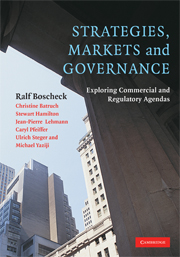Book contents
- Frontmatter
- Contents
- List of Figures, Boxes and Tables
- Acknowledgments
- Preface
- Notes on Contributors
- Part I Introduction and overview
- Part II Firm-level
- 2 Competitive advantage and the regulation of dominant firms
- 3 Delegating regulation: Supply-chain management, partnering and competition policy reforms
- 4 Diffusion of corporate governance regulation: France, Germany, the UK and the USA
- 5 Corporate governance after Enron et al.
- 6 Tackling healthcare fraud!?
- 7 Watchdog and proxy war campaigns against firms
- 8 Oil and conflict: Lundin Petroleum's experience in Sudan
- Part III Industry-level
- Part IV Country/International level
- Part V An observation in closing
- Index
2 - Competitive advantage and the regulation of dominant firms
Published online by Cambridge University Press: 06 July 2010
- Frontmatter
- Contents
- List of Figures, Boxes and Tables
- Acknowledgments
- Preface
- Notes on Contributors
- Part I Introduction and overview
- Part II Firm-level
- 2 Competitive advantage and the regulation of dominant firms
- 3 Delegating regulation: Supply-chain management, partnering and competition policy reforms
- 4 Diffusion of corporate governance regulation: France, Germany, the UK and the USA
- 5 Corporate governance after Enron et al.
- 6 Tackling healthcare fraud!?
- 7 Watchdog and proxy war campaigns against firms
- 8 Oil and conflict: Lundin Petroleum's experience in Sudan
- Part III Industry-level
- Part IV Country/International level
- Part V An observation in closing
- Index
Summary
More than 110 years after passing the US Sherman Act and nearly half a century after the enactment of EU competition rules, antitrust authorities on both sides of the Atlantic continue to search for general principles to assess the abuse of market power by dominant firms. But just as recent, high-profile cases, involving corporations such as American Airlines, 3M, Michelin, Deutsche Telekom, IMS Health or Microsoft, left the law unsettled, ongoing policy reviews, organized by the European Commission, the US Department of Justice and the Federal Trade Commission, have yet to clarify standards for dominance abuse as well as viable efficiency defenses. Business needs guidance on permissible practices, but drafting acceptable rules is far from simple. This chapter contrasts business and regulatory views on competitive advantage and offers a non-technical sketch of US and EU approaches to assessing market power and its potential abuse. Do current EU reform initiatives address vital policy concerns?
Competitive advantage – business and regulation
The tasks of devising a competitive strategy and assessing its economic impact focus on the same question: How can a company attain and sustain above-industry-average profitability? Answers provided by business and antitrust authorities frequently differ, which is surprising, given that both sides are often guided by the same economic references.
Regulatory authorities apply concepts from industrial and institutional economics in assessing and, for the purpose of rule writing, pre-judging the viability and welfare effects of diverse market structures and types of firm behavior.
- Type
- Chapter
- Information
- Strategies, Markets and GovernanceExploring Commercial and Regulatory Agendas, pp. 35 - 51Publisher: Cambridge University PressPrint publication year: 2008



